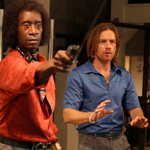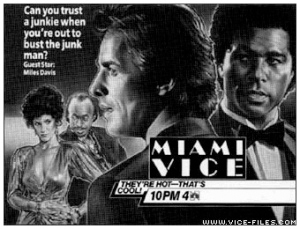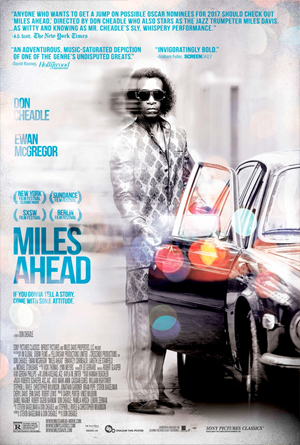
 MILES AHEAD is the directorial debut of Don Cheadle, and he stars in it as Miles Davis. I think it didn’t get much attention for the same reason it’s good: it’s a small, odd movie, not fulfilling most expectations of a musician biopic. I’m not sure if it even is a musician biopic. Maybe it’s a little of that mixed with Miles’ guest appearance on Miami Vice. It’s a small time crime story where the lead happens to be Miles Davis and the McMuffin is a reel-to-reel of the only recording session he’s done in years. He wants it for himself but Columbia Records has contractual claim to it, so people are trying to get it.
MILES AHEAD is the directorial debut of Don Cheadle, and he stars in it as Miles Davis. I think it didn’t get much attention for the same reason it’s good: it’s a small, odd movie, not fulfilling most expectations of a musician biopic. I’m not sure if it even is a musician biopic. Maybe it’s a little of that mixed with Miles’ guest appearance on Miami Vice. It’s a small time crime story where the lead happens to be Miles Davis and the McMuffin is a reel-to-reel of the only recording session he’s done in years. He wants it for himself but Columbia Records has contractual claim to it, so people are trying to get it.
The story takes place over just a couple of days, with the device of Ewan McGregor as totally fictional Rolling Stone writer Dave Braden barging his way into the “black Howard Hughes” life of Miles, promising to write his “comeback story!” At first Miles gives him many variations of “fuck off, white boy,” but eventually the two are hanging out together. Making this odd couple happen requires deceit and cocaine and puts the reporter in the middle of many tense situations involving guns and/or a fierce insistence on artistic purity.
Many of the highlights are scenes (sketches? solos?) of different odd encounters, like a confrontation in the lobby of the record company, or visiting the apartment of a young white drug dealer and being pressured to autograph his records. I don’t know which, if any, of these situations really occurred in some form, but it’s fun to see what happens when this character of Miles Davis – cool, scratchy voiced, unpredictable, crazy Miles Davis – is inserted into them. I mean, maybe we’ve pictured before what Miles was like at various ages playing in smoky night clubs or in studios. We probly haven’t thought about what would happen if he showed up at our apartments and looked at our stuff.
 One scene that I know is based on actual history is a flashback of white cops harassing and then beating up Miles for standing with a white woman in front of the Birdland club during a break from a gig. That’s one of the scenes that would also be in the traditional WALK THE LINE version of a Milesography, but you can see why they wouldn’t leave it out. It’s powerful because it simultaneously evokes the “this is how bad it used to be” movies about the civil rights era and the fresh-off-the-presses headlines of today. Ouch.
One scene that I know is based on actual history is a flashback of white cops harassing and then beating up Miles for standing with a white woman in front of the Birdland club during a break from a gig. That’s one of the scenes that would also be in the traditional WALK THE LINE version of a Milesography, but you can see why they wouldn’t leave it out. It’s powerful because it simultaneously evokes the “this is how bad it used to be” movies about the civil rights era and the fresh-off-the-presses headlines of today. Ouch.
But the main body of the movie takes place a little later in Miles’s career. At the time of this story he’s been “silent” for five years. This seems to be due to some combination of drug addiction and being sick of his old shit. The label is being pretty patient with him, but they would obviously prefer new music to putting out compilations. Any mention of that pisses him off, though. I don’t know if it’s because he doesn’t want to have his art rushed, or because he’s embarrassed that he still doesn’t have anything. Maybe it’s both.
I didn’t know enough about Miles so I thought this was supposed to be right before his electric period where he recorded On the Corner and Bitches Brew and leapt ahead from jazz (he says he doesn’t like that word though) to an electric hybrid with elements of funk and acid rock. They seem to show him working on his score for the documentary about Jack Johnson, which would’ve been early ’70s, but my research tells me the five years of silence period took place later.
Then again, this is not meant to be accurate in the details, including the chronology of when he recorded each album. The underneath is supposed to be true, doesn’t matter about the surface. I don’t care if the music is historically accurate or not because it’s worth it to recontextualize some it (Agharta maybe? I couldn’t remember which one it was) as blaxploitation score by using it during a chase scene and fist fight.
It never feels like that usual biopic slog from the small clubs to the charts to the drug addiction and the hitting-his-wife-one-time-to-represent-a-long-history-of-abuse, yet it has notes of all of those things. Within this mini-heist and memories it manages to hit on his hunger for innovation, his label’s mixture of respect and frustration with him, his fierce protection of his work, his prickliness (especially toward white people), his craziness (firing a gun in the Columbia Records lobby), his cryptic interviews, his failure as a husband, his cruelty, his addiction, his eccentricities, his boxing fandom.
The most humanizing touch is that he’s tormented by regrets about his failed marriage to Frances Taylor (Emayatzy Corinealdi, VAMPZ), haunted by her photo on the cover of Some Day My Prince Will Come, flashing back to pieces of their relationship starting and ending. He remembers her dancing, putting up with him, no longer putting up with him.
It does not linger on his abusiveness, and maybe that’s going too easy on him. But it’s not as if they make him into a cuddly teddy bear. It’s one of Cheadle’s best performances, capturing Miles’ particular cool but also his icy distance. Charisma and menace. The raspy voice, limping strut, smoking, sunglasses, fashion, sniffing, mumbling. It’s all there but it never feels like an impressionist’s bag of tricks. From what I understand, Cheadle even learned to play trumpet so the playing wouldn’t look fake.
Cheadle’s co-writers are all people who worked on other interesting biographies. Steven Baigelman has a story credit on GET ON UP, and Stephen J. Rivele and Christopher Wilkinson wrote NIXON and ALI. But here they go further off book. The short wraparound scenes, with the reporter character for some reason interviewing Miles on film, are the only corny part, but I forgive them because they express the idea that Miles is describing his life through music, and Cheadle is describing that music through this movie. So this is the best translation we can get.
My buddy Leo told me to look at the movie itself as jazz, starting off with some truth, then improvising for a while before coming back. Cheadle told Vulture, “I just thought that a movie about this person needed to be as mercurial and unexpected and improvisational as his music was.”
Whatever the intent, it’s definitely not literalism. This is most clearly illustrated in the big finale, a jam session with Cheadle-as-old-Miles, the actual old Herbie Hancock, new school jazz guy Robert Glasper (who is also musical supervisor, composer and arranger for the movie) and others. Miles, I do believe, is wearing a hashtag on his shirt, which seems to imply that this performance is taking place in the present. I don’t even know how they did it exactly, because it really sounds like they’re playing live, but Cheadle can’t be really playing. Glasper does have an album where he reworks old Davis recordings, so maybe it’s something like that?
And there’s a mysterious element in this character called Junior (Keith Stanfield, who briefly played Snoop Dogg in STRAIGHT OUTTA COMPTON). He’s a talented young player who a sleazy manager (Michael Stuhlbarg) is trying to introduce to Miles as a way of boosting the kid’s career. It’s a really good performance by Stanfield, who makes the character relatable because he’s so clearly uncomfortable with getting pushed into this mess. He doesn’t want to meet an icon under these forced circumstances, and when he finally does meet him it’s actually way worse than he bargained for. It’s roughly as if Miles is the star of a ’70s cop show and Junior is in a bit part as a street hood he chases down and muscles into giving up when the big shipment is coming in. Not really how he wanted it to go.
I figured Junior wasn’t based on any specific musician, but when I asked my buddy about this he suggested that maybe Junior was a young version of Miles. I know, it sounds like some dumb fan theory shit, but actually I think he might be right. While Miles is desperately trying to escape his old style, we see Junior on stage playing in this acid-electric style like Bitches Brew. And later he helps Miles turn his incomplete ideas into new music. Watching it this struck me as wrong – how could some fictional musician (other than a time traveling Michael J. Fox) be credited with Miles’ creation? But it works if it’s a memory of young, adventurous Miles getting old Miles over the hump. Literally it makes no sense, but poetically it’s the only way that it makes sense.
Anyway, the ending text does not tell us when Miles died, like your standard biography. It tells us that he did not. That’s a weird and beautiful sentiment, and hopefully meant to leave it open for sequels. I’d love to see Cheadle’s Miles Davis character in other cool genre movies. He could be a boxing trainer in Spain, or a genius profiler trying to catch a serial killer whose crimes are based on jazz standards. He could be on an adventure to find the Lost Secret of the Water Babies, or a hardcase forced to coach a little league team. It could be another buddy movie with his white Rolling Stone friend, or a lone reluctant hero DIE HARD type situation at the Montreaux Jazz Festival. The possibilities are limitless. Let this character riff on any of the old classics, I think you will be impressed.
MILES DAVIS WILL RETURN IN BLUE JUSTICE



























August 23rd, 2016 at 11:53 am
This was barely a blip on my movie radar, having seen the trailer, vaguely remembering a limited theatrical release, and then nothing. However, it does sound like a movie I want to see.